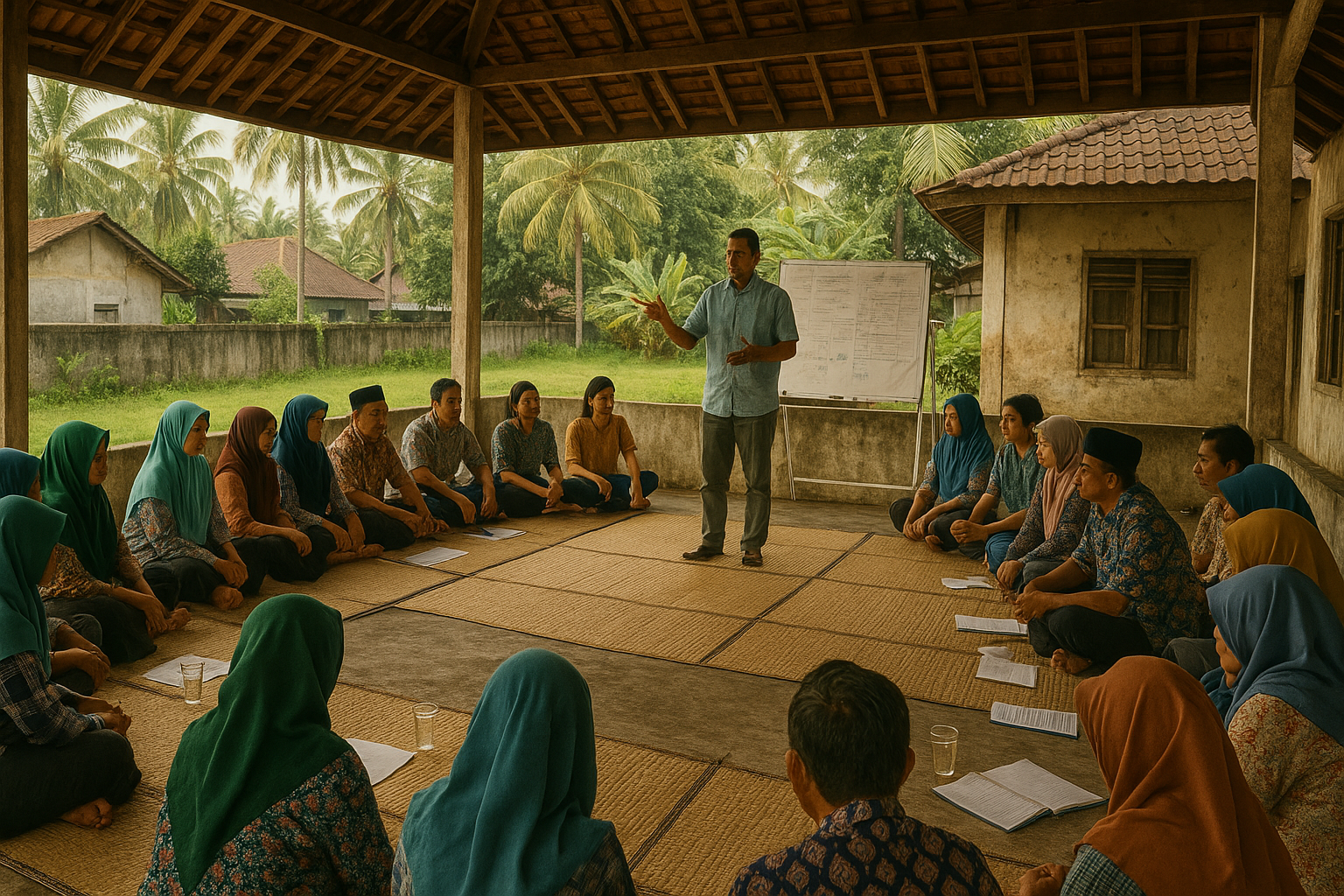How Community Deliberation Shifts Local Funds Toward Climate Adaptation in Indonesia
A World Bank–led study in Indonesian villages found that while climate information alone had little effect, structured community deliberation significantly shifted local spending priorities toward adaptation and mitigation. The findings suggest that empowering villagers to reason and decide collectively is more effective for driving climate action than awareness campaigns alone.

The Social Development Global Department of the World Bank, working in collaboration with The Nature Conservancy, the Dala Institute in Indonesia, and the Keough School of Global Affairs at the University of Notre Dame, has published a groundbreaking study on how communities can be encouraged to prioritize climate action when allocating development funds. The research, carried out in 15 Indonesian villages across diverse ecological and social landscapes, tested whether providing climate knowledge or facilitating group deliberation is more effective in shifting local spending priorities toward adaptation and mitigation. The central message of the paper is striking: information matters, but the process of deliberation, villagers' reasoning together, and negotiating shared priorities proved to be the most powerful catalyst for change.
Indonesia’s Unique Test Case
Indonesia presents a particularly revealing backdrop for this study. It is both one of the world’s largest greenhouse gas emitters and one of the most vulnerable countries to climate impacts. Floods, droughts, rising seas, and heat stress are becoming increasingly common, threatening coastal populations, rural farmers, and fisheries alike. Since the introduction of the 2014 Village Law, every rural community has received about $100,000 annually to spend on local development. These funds could, in theory, support resilience projects such as flood defenses, mangrove restoration, or drought preparedness. Yet in practice, they are typically used for roads, administrative costs, or short-term social assistance. The researchers asked a crucial question: what would it take to persuade villagers to direct these funds toward climate action, given the mounting risks?
Inside the Experiment
To answer this, researchers conducted a randomized controlled trial involving 823 participants, of whom 808 completed all surveys. Villages spanned peatland farming settlements in South Sumatra, coastal communities in Central Sulawesi, and forest-based livelihoods in West Papua. Participants were divided into four groups. The control group received no climate information at all. The first treatment group watched an animated video about climate change and heard a presentation on their village’s specific vulnerabilities. The second group received the same information but also discussed and voted on development priorities. The third group received information, held discussions, and then engaged in a structured deliberation process designed to reach group consensus. Surveys before and after asked villagers to rank climate-related spending, adaptation, disaster risk reduction, or environmental conservation, against other categories such as infrastructure or economic development.
The results were unambiguous. Villagers who participated in deliberation were far more likely than others to elevate climate action as a priority. Not only did they rank adaptation and mitigation more highly in their final decisions, but they also showed a significant shift upward compared to their pre-treatment rankings. Information alone, or even information combined with simple voting, did little to change spending preferences. The deliberative process itself, where participants listened, reasoned, and argued toward a shared outcome, was the decisive factor.
From Families to Communities
One of the most interesting findings was the difference between family and community perspectives. When participants were asked to consider what their families needed, climate action did not see major gains. But when asked to rank spending priorities for their villages as a whole, those who deliberated shifted significantly toward adaptation and mitigation. This suggests that people are more likely to recognize the value of climate action when they think collectively rather than individually. Climate threats such as floods or forest fires rarely yield immediate private benefits if addressed, but they are critical for safeguarding the broader community. Deliberation, by encouraging villagers to think as a group, bridged this gap between individual and collective priorities.
The researchers also tested whether improved knowledge was the mechanism behind the shift. Educational materials did raise comprehension, as measured by responses to a set of climate-related questions. Yet further analysis showed that this improved understanding did not explain the change in funding preferences. Instead, it was the act of deliberating, the process of debating, reasoning, and seeking consensus, that drove the change. In other words, information laid the foundation, but deliberation turned it into action.
Lessons for Global Climate Policy
The implications of this study stretch far beyond Indonesia. Many countries are channeling resources into local development funds and promoting community-level decision-making as part of their climate and development strategies. Yet, as this research demonstrates, money alone will not automatically lead to climate-smart investments. Without participatory structures that encourage communities to reason together, funds may continue to flow into conventional projects, leaving vulnerabilities unaddressed. By contrast, when communities deliberate, they are more likely to align spending with long-term resilience.
The findings also highlight the democratic value of deliberation. The effect was consistent across gender groups, including in villages where only women were sampled, showing that structured group reasoning produces robust outcomes regardless of demographic composition. This reinforces a growing body of evidence suggesting that deliberation helps communities move toward socially beneficial decisions by prioritizing fairness, collective well-being, and sustainability.
The research makes a powerful argument: tackling climate change requires more than top-down policies and technical fixes. It requires platforms where ordinary people, directly affected by climate risks, can come together, discuss, and make informed decisions about their futures. While international negotiations and national pledges set the stage, the success of climate action will depend on conversations held in small village halls, where citizens negotiate how to spend their limited funds. The Indonesian experiment demonstrates that when people deliberate, they are more likely to recognize the urgency of climate threats and act on them. At a time when global climate commitments need translation into local reality, this lesson may be one of the most hopeful and actionable insights yet.
- FIRST PUBLISHED IN:
- Devdiscourse










